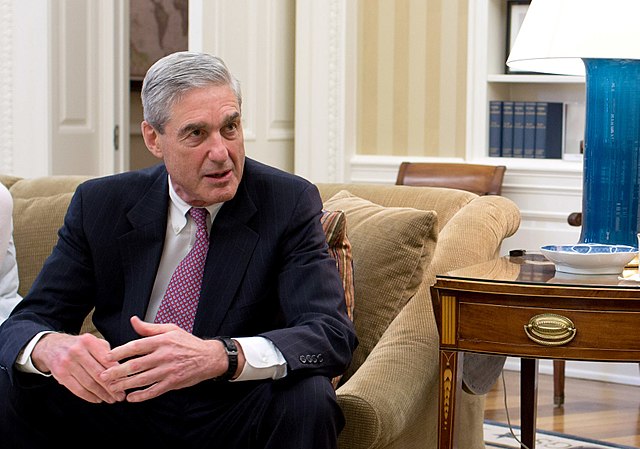
WASHINGTON — Special counsel Robert Mueller’s first — and possibly last — public statement on the Russia investigation is fueling fresh calls on Capitol Hill to begin impeachment proceedings against President Donald Trump, a step that Democratic leaders have so far resisted.
Surprising Washington with brief remarks Wednesday, Mueller indicated it’s up to Congress to decide what to do with his findings. The special counsel reiterated that, bound by Justice Department policy, charging a sitting president with a crime “was not an option.” But he also stressed he could not exonerate Trump. Instead, he cited that same policy to say, “The Constitution requires a process other than the criminal justice system.”
With Mueller closing his office and not expected to comment further, it all amounted, for some, to an open invitation for Congress to launch impeachment proceedings.
“He’s asking us to do what he wasn’t allowed to — hold the president accountable,” said Rep. Val Demings, D-Fla., a member of the House Judiciary Committee, the panel with impeachment power.
“We have one remaining path to ensure justice is served,” said Sen. Cory Booker of New Jersey, a Democratic candidate for president. “It’s clear that the House must begin impeachment proceedings. No one is above the law.”
But top Democrats, with almost no support from Republicans, are hesitant to go it alone on an impeachment inquiry that House Speaker Nancy Pelosi has warned would be divisive for the nation. They prefer to continue the work of investigating the president and building, as Pelosi said Wednesday, a case that’s “very compelling to the American people.”
“We are legislating, we’re investigating and we are litigating,” Pelosi said at an event in San Francisco.
“Nothing is off the table,” she said. “We want to do what is right and what gets results.”
Staying the course, Rep. Jerrold Nadler, D-N.Y., the chairman of the Judiciary Committee, at a news conference in New York stopped short of calling for an impeachment inquiry.
“All options are on the table and nothing should be ruled out,” Nadler said Wednesday.
Nadler’s committee is among six in the House that are conducting dozens of probes in the Democratic-controlled House into subjects such as Trump’s tax returns, the handling of the Russia probe and the running of government.
“Given that special counsel Mueller was unable to pursue criminal charges against the President, it falls to Congress to respond to the crimes, lies and other wrongdoing of President Trump – and we will do so,” Nadler said in a written statement issued immediately after Mueller’s remarks.
Before Mueller’s unexpected appearance, Democratic leaders had tamped down increasingly vocal voices calling for an impeachment inquiry. Pelosi sent lawmakers home for a weeklong recess brushing back the pro-impeachment faction, urging her caucus to stick with the step-by-step approach of investigations. They hoped to hear directly from Mueller in a high-profile hearing that could help focus public attention.
But now that Mueller has made clear the work ahead won’t likely include him — announcing his office is closing and he’s resigning his position — it’s igniting new urgency on Capitol Hill to pick up where the special counsel left off.
Rep. Seth Moulton of Massachusetts, another Democratic presidential hopeful, said, “Mueller did his job. Now it’s time to do ours. Impeachment hearings should begin tomorrow.”
While some Democrats want to focus on investigating Trump, building the record in the public, as happened during the Watergate era with Richard Nixon, others, including some new voices Wednesday, say Mueller has all but punted the issue to Congress. They believe opening a formal impeachment proceeding would strengthen their hand in the legal battles over documents and testimony.
“It is very clear that President Trump is engaging in a coverup, obstructing of justice and betraying his oath of office,” said Rep. Betty McCollum, D-Minn. “I fully expect the responsible House committees to expedite their investigations and, as soon as possible, formally draft articles of impeachment.”
Mueller’s report did not establish a criminal conspiracy between Russia and the Trump campaign to sway the outcome of the 2016 presidential election in Trump’s favour. Investigators examined nearly a dozen episodes involving the president for potential obstruction of justice but ultimately reached no conclusion on whether Trump had illegally tried to stymie the probe.
Mueller made clear his desire to avoid testimony, declaring the report his final word on the matter. He said it wouldn’t be “appropriate” for him “to speak further about the investigation.”
Nadler would not say whether he would compel Mueller to testify, as he has threatened to do. But he hinted that he may not pursue an aggressive approach against the special counsel, saying, “Mr. Muellertold us a lot of what we need to hear today.”
Republicans, as they have done since Mueller’s report was released, called for Congress to move on.
The GOP chairman of the Senate Judiciary Committee, Sen. Lindsey Graham of South Carolina, said that Mueller ”has decided to move on and let the report speak for itself. Congress should follow his lead.”
Graham has said his committee doesn’t need Mueller to testify. Georgia Rep. Doug Collins, the top Republican on the House Judiciary panel, had supported Democratic requests for Mueller’s House testimony but appeared to be satisfied by the special counsel’s comments Wednesday.
“While I had hoped he would come before the committee and answer questions from lawmakers, Robert Mueller has led an extraordinary life of public service and is entitled to his life as a private citizen once again,” Collins said.
But at least one Republican isn’t ready to move on: Rep. Justin Amash of Michigan, who has become the sole GOP voice in Congress urging impeachment proceedings.
“The ball is in our court, Congress,” Amash tweeted.
——
Associated Press writers Laurie Kellman and Elana Schor in Washington contributed to this report.